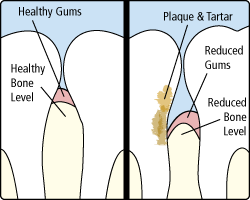Gum Disease Treatment in West Chester, PA

Gum disease, also called periodontal disease, is an infection. It affects the tissues and bone that support the teeth. Healthy gum tissue fits like a cuff around the tooth. When someone has periodontal disease, the gum tissue pulls away from the tooth. As the disease gets worse, the tissue and bone that support the tooth are damaged. Over time, teeth may fall out or need to be removed. Treating periodontal disease in the early stages can help prevent tooth loss.
Causes of Periodontal Disease
Periodontal disease is caused by plaque—a sticky film that is always forming on your teeth. Plaque contains bacteria that can irritate and inflame the gums. Inflamed gums can pull away from the teeth and form spaces called “pockets.” These pockets collect more bacteria. If the infected pockets are not treated, the gum disease can get worse.
Risks of Periodontal Disease
While anyone can get periodontal disease, there are factors that can increase your risk:
- Poor oral hygiene
- Tobacco use
- Diseases that affect the whole body such as diabetes and AIDS
- Genetics
- Many medications such as steroids and blood pressure drugs have side effects that reduce saliva, which can affect soft tissues and make tooth decay more likely.
- Teens, pregnant women, and those taking birth control pills face changes in hormone levels. These changes can cause gums to become more sensitive to plaque bacteria.
Treatment of Periodontal Disease
Your gum disease treatment will depend on several factors, including your personal health history and the stage of your gum disease.
The first step in treating gum disease usually involves scaling and root planning. This may be done over more than one visit, depending on your personal needs.
- Scaling: Your dentist or hygienist removes plaque and tartar down to the bottom of each periodontal pocket.
- Root Planing: Then, the root surfaces of your teeth are smoothed or planed to allow the gum tissue to heal and reattach to the teeth.
Your dentist or hygienist may recommend certain medicines to help control infection and discomfort or to aid healing.
You will have a follow up visit with your dentist or hygienist after your treatment. At this visit, Dr. Milillo, Dr. Saldivar, or your hygienist will review and measure your periodontal pockets. Our staff is very caring and sensitive to your personal care and needs when it comes to your periodontal treatment, as well as your entire dental experience.
Periodontal Disease Prevention
- Brush your teeth twice a day with fluoride toothpaste.
- Floss or use an interdental cleaner daily to remove plaque and food from areas your toothbrush can’t reach.
- Eat a healthy diet and limit snacks.
- Visit Water’s Edge Dental regularly for professional cleanings.

